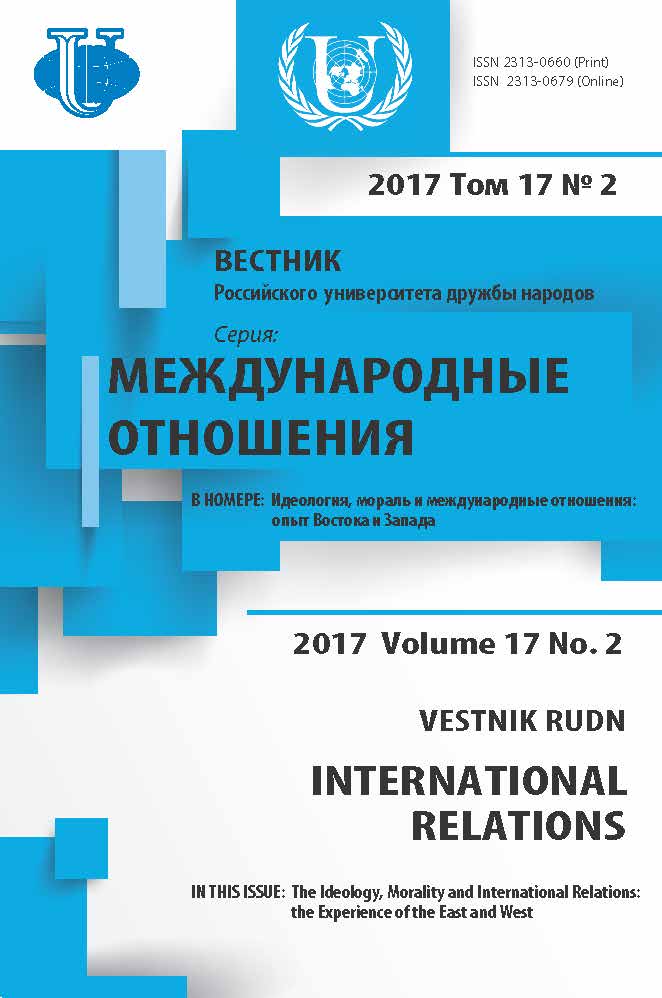Françafrique and Ethics in International Relations
- Authors: Filippov V.R.1
-
Affiliations:
- Institute for African Studies, Russian Academy of Sciences
- Issue: Vol 17, No 2 (2017): The Ideology, morality and international relations: the experience of the East and West
- Pages: 402-415
- Section: HISTORY OF INTERNATIONAL RELATIONS
- URL: https://journals.rudn.ru/international-relations/article/view/16073
- DOI: https://doi.org/10.22363/2313-0660-2017-17-2-402-415
Cite item
Full Text
Abstract
The article discusses the corruption ties between the political elites of France and a number of sovereign African states that were part of the French colonial empire until the middle of the last century. An analysis of the reasons is given that prompted the first President of the Fifth Republic, General Charles de Gaulle, to begin the formation of a special military and political phenomenon, later named “Fransafrique”. The nature of this phenomenon is revealed as a special combination of latent lobbyist networks of the military-political and economic influence of the Elysee Palace in the countries of the Black Continent, on the one hand, and as a specific mechanism for implementing the French version of neocolonialism in political practice, on the other hand. The point is made that the threat of the loss of all military and strategic, political and, in particular, economic preferences of France in the newly independent African countries, prompted the Elysee Palace to semi-legal, illegal, and often criminal methods of defending the interests of France in the region. In practice, this meant the construction of a system of integral dependence of the formally independent countries of Tropical Africa from the former metropolis, the formation of a tuple of client-states with corrupt power elites. The latter were designed to provide the French energy giants with virtually unlimited access to strategic natural resources, control over the political parties of these countries. The main emphasis in this French model of neocolonialism was made on the total bribery of the emerging political elites of African countries. The French special services used such methods maintaining control over the situation as blackmail, political assassinations or direct military aggression when the direct bribery of African politicians proved impossible or insufficient. Particular attention is paid to the problem of the influence of corrupt African leaders, in their turn, on the political class of France at different stages of the history of the Fifth Republic. It is concluded that the post-war policy of the former metropolis in the now sovereign states of Africa has led not only to the corrupting of dependent African leaders, but also to the corrupt decay of the leaders of the French political system.
About the authors
Vasily Rudolfovich Filippov
Institute for African Studies, Russian Academy of Sciences
Author for correspondence.
Email: fvr@mail.ru
Moscow, Russia
References
- Dozon, J.-P. (2002). L’état franco-africain. Les Temps Modernes, 4.
- Esten, V. Zh. de. (1990). Power and Life. Moscow: Mezhdunarodnye otnosheniia. (in Russ.).
- Filippov, V. R. (2016). “Francafrique”: the shadow of the Elysee Palace on the Black Continent. Moscow: Goriachaia liniia — Telekom.
- Gaulle, Ch. de. (1972). Memoires d Espoir. Le renouveau 1958—1962. Paris: Plon.
- Molchanov, N. (1972). General de Goll. Moscow: Nauka. (in Russ.).
- Monod, J.-L. (1926). Histoire de l’Afrique Occidentale. Paris: C. Delagrave.
- Péan, P. (2011). La République des mallettes — Enquête sur la principauté française de non-droit. Paris: Fayard.
- Pesnot, P. (2011). Les Dessous de la Francafrique. Paris: Nouveau Monde.
- Podgornova, N. P. (2015). French policy in North-West Africa. Moscow: Institut Blizhnego Vostoka. (in Russ.).
- Rémond, R. (1998). Le retour de De Gaulle. Vol. 96 de la collection Questions au XXe siècle. Éditions Complexe.
- Sidorova, G. M. & Korendiasov, E. N. (2011). France — Africa: in Search of New Approaches. Afrika v sovremennykh mezhdunarodnykh otnosheniiakh. Moscow: Institut Afriki. (in Russ.).
- Vasil'ev, A.P. (1999). General de Gaulle and the collapse of the French Empire. Natsional'nye interesy, 2 (3). (in Russ.).
- Verschave, F. X. (1999). La Françafrique: Le plus long scandale de la République. Paris: Stock.
- Vinay, B. (1988). Zone franc et cooperation monétaire. Paris: République française, Ministère de la coopération.
- Winock, M. (1995). La Fièvre hexagonale. Les grandes crises politiques de 1871 à 1968. Paris: Seuil.
- Winock, M. (2006). L'agonie de la IVe République. 13 mai 1958. Paris: Gallimard.











